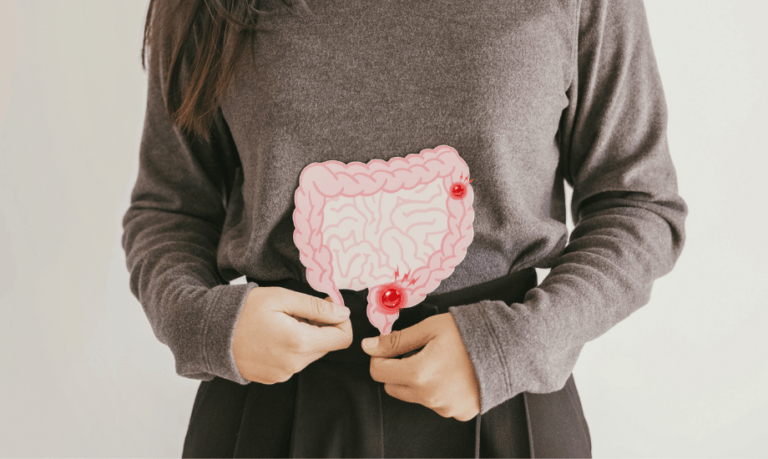The Problem of Slow Gut Motility
Meet Erin. She’s a vibrant young professional with a zest for life. But behind her confident smile, Erin battled a silent struggle – constipation. Every morning began with a sense of dread as she faced the persistent discomfort of incomplete bowel movements.
Despite her efforts, including the recommendation of her doctor to try Miralax, relief remained elusive. Erin found herself trapped in a cycle of temporary fixes, never experiencing the complete relief she longed for. This constant battle with her gut impacted more than just her physical well-being; it seeped into her confidence and affected her day-to-day life.
Simple tasks became daunting challenges as Erin grappled with the discomfort and uncertainty that came with this. Social outings became tinged with anxiety, always accompanied by the worry of unpredictable flare-ups and severe bloating.. Even in professional settings, she couldn’t shake the nagging feeling of being held back by something beyond her control.
As time passed, Erin realized that her struggle with slow gut motility wasn’t just a physical inconvenience; it was taking a toll on her mental and emotional well-being. She yearned for a solution that would not only alleviate her symptoms but also restore her confidence and sense of freedom.
What is slow gut motility
Slow gut motility, often misunderstood, is a condition characterized by the sluggish movement of food and waste through the digestive tract. When the digestive system fails to efficiently propel contents along its path, it can lead to a myriad of issues. Slow gut motility is not only a discomfort in itself but also a significant contributor to recurring Small Intestinal Bacterial Overgrowth (SIBO) and dysbiosis.
The stagnation of food in the intestines creates an environment ripe for bacterial overgrowth, particularly in the small intestine where bacteria should be limited. This overgrowth can exacerbate symptoms of bloating, gas, and abdominal discomfort, perpetuating a cycle of bloating and constipation discomfort and distress.
Additionally, slow gut motility disrupts the delicate balance of gut microbiota, leading to dysbiosis—a condition marked by an imbalance in the gut microbial community. Dysbiosis further complicates digestive health, impacting nutrient absorption, immune function, and overall well-being. Therefore, addressing slow gut motility is crucial not only for alleviating immediate symptoms but also for preventing the recurrence of SIBO and restoring balance to the gut microbiome.
Understanding the Culprits Behind Slow Gut Motility
Food Poisoning:
Episodes of food poisoning can disrupt the normal functioning of the digestive system, leading to inflammation and damage to the gut lining.
This damage can impair the muscles responsible for moving food and waste through the intestines, resulting in slow gut motility.
Intestinal Permeability (Leaky Gut):
Intestinal permeability, often referred to as “leaky gut,” occurs when the lining of the intestines becomes compromised, allowing toxins, bacteria, and undigested food particles to leak into the bloodstream.
Chronic inflammation associated with leaky gut can interfere with the coordinated contractions of the gastrointestinal muscles, contributing to slow gut motility.
Methane-Producing Bacteria (SIBO):
Small Intestinal Bacterial Overgrowth (SIBO), particularly with methane-producing bacteria, is closely linked to slow gut motility.
Excessive levels of methane-producing bacteria can interfere with the proper movement of food through the intestines, resulting in constipation and sluggish bowel movements. Many individuals still experience bloating after SIBO treatment, indicating persistent gut issues.
Stress:
Chronic stress can have profound effects on digestive health, including slowing down gut motility.
The brain-gut connection plays a significant role, as stress can trigger changes in intestinal contractions and lead to a delay in bowel movements.
Poor Digestion:
Inadequate digestion, often stemming from factors such as enzyme deficiencies or insufficient bile production, can contribute to slow gut motility.
When food is not properly broken down and absorbed, it can linger in the intestines, causing discomfort and impeding the normal movement of the digestive process. Individuals may turn to SIBO Miralax or other interventions, but you’ve got to “gut personal” with your own gut health for long-term relief.
The Role of Minerals & Gut Motility
Minerals such as sodium, potassium, and magnesium play crucial roles in regulating gut motility and overall digestive health. Here’s how they contribute to gut motility and what happens when deficiencies occur.
Sodium:
- Sodium helps maintain proper fluid balance in the body, including the digestive tract.
- Adequate sodium levels are essential for the smooth contraction and relaxation of the muscles in the intestines, facilitating the movement of food and waste through the digestive system.
- When sodium levels are deficient, it can lead to decreased muscle function in the intestines, resulting in slower gut motility and constipation.
Potassium:
- Potassium is another electrolyte crucial for maintaining proper muscle function throughout the body, including the smooth muscles of the gastrointestinal tract.
- Potassium ions play a role in nerve signaling and muscle contraction, helping to regulate the rhythmic contractions of the intestines that propel food forward.
- Deficiencies in potassium can disrupt these muscle contractions, leading to irregular bowel movements and constipation.
Magnesium:
- Magnesium is involved in over 300 enzymatic reactions in the body, including those related to muscle function and relaxation.
- Adequate magnesium levels are necessary for proper muscle contractions in the intestines, promoting regular bowel movements and preventing constipation.
- Deficiencies in magnesium can lead to muscle spasms and irregular contractions in the intestines, resulting in slowed gut motility and constipation.
When deficiencies in these essential minerals occur, gut motility can be compromised, leading to symptoms such as constipation, bloating, and discomfort. Therefore, maintaining adequate levels of sodium, potassium, and magnesium through a balanced diet or supplementation is essential for supporting healthy gut function and preventing digestive issues.
Functional Stool Testing – Uncovering the Root Causes
GI Map stool testing is a comprehensive diagnostic tool that analyzes various markers in the stool to assess gastrointestinal health. It is a test we use with our VIP clients and our gutTested clients.
It provides valuable insights into the composition of the gut microbiome, digestive function, and immune response, helping to identify underlying issues contributing to slow gut motility.
Here are a few of the markers we see on stool testing that will impact gut motility:
- Methanobrevibacter: Methanobrevibacter is a type of methane-producing bacteria commonly associated with SIBO. Elevated levels of Methanobrevibacter on GI Map testing can indicate bacterial overgrowth in the small intestine, which can contribute to slow gut motility. Methane gas slows gut motility and needs to be addressed to improve gut motility.
- Low Elastase: Elastase is an enzyme produced by the pancreas that helps digest proteins. Low levels of elastase detected on GI Map testing suggest pancreatic insufficiency, which can impair digestion and lead to slow gut motility.
- High Steatocrit: Steatocrit measures the amount of fat in the stool, indicating malabsorption of fats. High steatocrit levels observed on GI Map testing suggest poor digestion and absorption of dietary fats, which can contribute to slow gut motility.
- Low Secretory IgA: Secretory Immunoglobulin A (IgA) is an antibody that plays a crucial role in the immune defense of the gastrointestinal tract. Low levels of Secretory IgA detected on GI Map testing indicate compromised gut immunity, which can lead to dysbiosis and slow gut motility.
GI Map stool testing serves as a valuable tool for identifying underlying gastrointestinal issues contributing to slow gut motility, including bacterial overgrowth, digestive enzyme deficiencies, malabsorption, and immune dysfunction. By addressing these underlying factors, targeted interventions can be implemented to support optimal gut health and improve gut motility.
Why Miralax Falls Short – The Limitations of Traditional Treatments
While Miralax, Linzess, and Motegrity are commonly prescribed solutions for individuals struggling with constipation and slow gut motility, they often fall short of addressing the underlying causes of these issues. Miralax, a laxative, provides temporary relief by softening stool and promoting bowel movements, but it does not tackle the root causes of slow gut motility.
Similarly, Linzess and Motegrity work by stimulating bowel movements through different mechanisms, but they also fail to address underlying factors contributing to gut motility issues.
These medications do not address issues such as bacterial overgrowth, digestive enzyme deficiencies, or immune dysfunction, which are often the primary drivers of slow gut motility. Furthermore, reliance on these medications may lead to dependency and potential side effects without addressing the core issue.
For individuals seeking long-term relief and optimal gut health, it’s essential to explore comprehensive treatment approaches that target the underlying causes of slow gut motility. This may involve lifestyle changes, dietary modifications, supplementation, and targeted therapies aimed at restoring normal gut motility and function.
Practical Tips for Improvement – Taking Action to Enhance Gut Motility
To get started in improving your gut motility, try some of these simple tips.
- Drink Ginger Tea:
- Ginger has natural digestive properties that can help stimulate digestion and promote gut motility. Drinking ginger tea after meals may aid in digestion and alleviate symptoms of slow gut motility.
- Walk After Meals:
- Taking a short walk after meals can help stimulate digestion and encourage the natural movement of food through the digestive tract. This gentle exercise promotes gut motility and can reduce the risk of bloating and discomfort.
- Support the Vagus Nerve and “Rest and Digest”:
- Engage in relaxation techniques such as deep breathing exercises or meditation to support the vagus nerve, which plays a key role in regulating digestion. Creating a calm and relaxed environment during meals promotes the “rest and digest” mode, enhancing gut motility and overall digestive function.
- Improve Gut Bacterial Balance:
- Consume probiotic-rich foods such as yogurt, kefir, sauerkraut, and kimchi to support a healthy balance of gut bacteria. Probiotics help maintain proper digestion and gut motility by promoting the growth of beneficial bacteria in the intestines.
- Additionally, if you have a history of SIBO, severe constipation or long term gut issues, consider getting functional stool testing and implementing personalized protocols to help support your gut bacteria (our team supports clients with this in both our VIP program and gutTested)
- Focus on Improving Stomach Acid and Overall Digestion:
- Incorporate digestive enzymes or digestive bitters before meals to support the breakdown of food and enhance digestion. Adequate stomach acid and digestive enzymes are essential for optimal nutrient absorption and gut motility.
- Reduce Stress While Eating:
- Practice mindful eating techniques to reduce stress and promote relaxation during meals. Avoid eating in a rushed or stressed state, as this can negatively impact digestion and gut motility. Take time to chew food thoroughly and savor each bite, allowing the body to properly process and digest nutrients.
By incorporating these practical tips into your daily routine, you can support healthy gut motility and improve overall digestive health. Remember to consult with a healthcare professional before making any significant changes to your diet or lifestyle, especially if you have underlying medical conditions or concerns.
In conclusion, addressing slow gut motility is essential for maintaining optimal digestive health and overall well-being. From understanding the underlying causes to implementing practical lifestyle changes, taking proactive steps can help alleviate symptoms and prevent further consequences of gastrointestinal issues. By promoting gut bacterial balance, supporting digestion, and reducing stress during meals, individuals can improve gut motility and enhance their quality of life.
With personalized guidance and comprehensive treatment approaches, individuals can address the root causes of slow gut motility and prevent the recurrence of gastrointestinal issues. Don’t hesitate to reach out for support and take control of your gut health today to enjoy a healthier, happier future.








